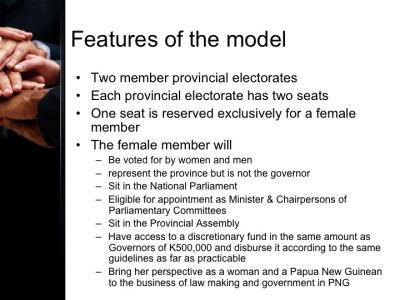There has been a lot of talk in the media about the proposed new law to reserve 22 Parliamentary seats for women but very little detail about how the law would work in practice. To try and explain what the law would mean, below are four slides used in the Regional Roadshow that toured the country earlier this year.

[img_assist|nid=2843|title=|desc=|link=none|align=center|width=400|height=300]
[img_assist|nid=2845|title=|desc=|link=none|align=center|width=400|height=300]
[img_assist|nid=2846|title=|desc=|link=none|align=center|width=400|height=300]
- rait man's blog
- Log in to post comments

Comments
I hope this comes up on time! PNG deserves a better future
I hope this comes up on time!
PNG deserves a better future equally distributed to the whole population.
All the best
As an Australian citizen I'd like to support this proposal via
As an Australian citizen I'd like to support this proposal via my Federal Government's representatives. In particular, I urge our Foreign Affairs Minister, Kevin Rudd, to communicate this support to the PNG Government. While Australian parliaments aren't a shining example of proportional representation for women and have not yet tried a system of reserved seats for women, it would be a great advantage for the citizens of PNG to be guaranteed represention in each electorate by a woman - who can be expected to be a good networker advocating for the needs of all men and children, as well as for women. I look forward to seeing how this might work in PNG if you're given the chance to lead the way.
PNG should look at the parliament structure of Rwanda where I
PNG should look at the parliament structure of Rwanda where I believe 50% of the parliamentarians are women.
It may be something to do with their culture. But that is something PNG may want to learn from.
As the Greens Womens affairs spokesperson in Aotearoa/New
As the Greens Womens affairs spokesperson in Aotearoa/New Zealand I would like to support proportional representation for women in the PNG Parliament. Having met Carol Kidu I was concerned that she stood alone representing 50% of the population in the PNG Parliament. The Green Party in our country supports creative ways to ensure that the marginalised get heard and especially the women leaders who have so much to offer all nations at all levels. There are different models from Parlaimentary quotas to Party list quotas but obvipusly PNG needs a model tat works for your nation - ask the women of PNG they will have a creative solution.
Good luck to all the supporters of this positive change/
Catherine Delahunty
Green Party of Aotearoa New Zealand
During my (very enjoyable) times spent in PNG I worked with, and
During my (very enjoyable) times spent in PNG I worked with, and met up with, some extremely wise, competent, compassionate local women who could easily contribute to the governance of their country. It's such a pity that the parliamentary system is so lop-sided.
I suspect if women like these were given such a chance they would help PNG work through its many difficulties, and give greater depth and insights to decisions that are made.
I remember when Australia had hardly any female members of parliament. It wasn't too long ago. Now things have changed and our national governance has been improved as a result.
Best wishes to those who are advocating for these reforms.